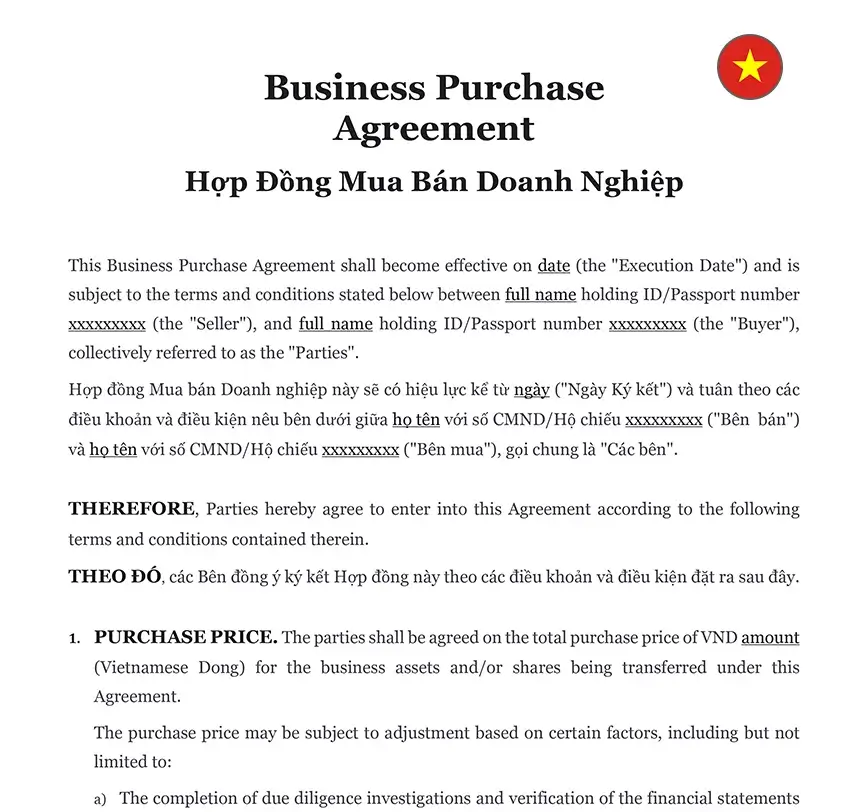Ready to use legal template
Drafted by experienced lawyers
Vietnamese-English translation
Ready to use legal template
Drafted by lawyers
Vietnamese-English translation
Home › Business contracts › Business Purchase Agreement
Learn more about Business Purchase Agreement in Vietnam
The Business Purchase Agreement is a pivotal document that solidifies the terms and conditions of a business sale, including the purchase price, payment structure, included assets, warranties, and other crucial details. Our meticulously crafted Business Purchase Agreement template is designed by legal experts to meet Vietnam’s legal standards. Delivered in an easily editable Word format, our template empowers you to tailor the agreement to your exact specifications, ensuring a comprehensive, legally binding document that safeguards your interests in the business transaction.
Table of contents
-
What is a Business Purchase Agreement?
-
What is included in a Business Purchase Agreement?
-
Can I use a Business Purchase Agreement for any type of business?
-
Do I need to conduct due diligence before signing in Vietnam?
-
What happens after it is signed in Vietnam?
-
What types of warranties and representations are included?
-
What is the difference between an asset and a stock purchase agreement?
-
Are there any tax implications in Vietnam?
What is a Business Purchase Agreement?
A Business Purchase Agreement is a legally binding document that facilitates the sale and purchase of a business. It outlines the terms and conditions of the transaction, including the purchase price, payment structure, assets included in the sale, liabilities, and other relevant details. This agreement serves as a roadmap for the transaction, ensuring that both the buyer and seller are aware of their rights and obligations. It also helps protect both parties by clearly defining the terms of the deal and providing a framework for resolving any disputes that may arise.
One of the key functions of a Business Purchase Agreement is to transfer ownership of the business from the seller to the buyer. This includes transferring assets such as equipment, inventory, intellectual property, and goodwill. The agreement also typically includes provisions regarding the allocation of liabilities, such as debts and obligations, between the parties. Additionally, the agreement may include warranties and representations from both parties regarding the condition of the business and its assets, as well as any other relevant information. Overall, a well-drafted Business Purchase Agreement is essential for ensuring a smooth and legally compliant transfer of ownership of a business.
What is included in a Business Purchase Agreement?
A Business Purchase Agreement typically includes several key elements:
Parties:
Identifies the buyer, seller, and any other involved parties.
Purchase Price:
States the total purchase price for the business and how it will be paid.
Assets:
Specifies which assets are included in the sale (e.g., inventory, equipment, intellectual property).
Liabilities:
Determines which liabilities, if any, the buyer will assume as part of the sale.
Representations and Warranties:
Outlines the promises and assurances made by each party regarding the business’s condition, legality, and other relevant factors.
Closing Conditions:
Specifies the conditions that must be met before the sale can be completed (e.g., obtaining necessary approvals, resolving outstanding issues).
Indemnification:
Describes how disputes and liabilities will be resolved, including any indemnification provisions to protect against losses.
Confidentiality:
Includes provisions to protect sensitive information disclosed during negotiations.
Non-Compete:
Addresses whether the seller will be restricted from competing with the business after the sale.
Can I use a Business Purchase Agreement for any type of business?
Yes, a Business Purchase Agreement is a flexible legal document that can be adapted to various types of businesses. Whether you are buying or selling a small local business, a franchise, a partnership, a corporation, or even a portion of a larger company, a well-drafted Business Purchase Agreement can be tailored to suit your specific needs. The agreement can address the unique aspects of the business being sold, such as its assets, liabilities, intellectual property, customer contracts, and more, making it a versatile tool for facilitating a wide range of business transactions.
Furthermore, a Business Purchase Agreement can be used for different industries and sectors, including retail, manufacturing, services, technology, and more. It can accommodate various sale structures, such as asset sales, stock sales, mergers, and acquisitions, providing a comprehensive framework for structuring the deal. By using a Business Purchase Agreement, both parties can ensure that their rights and obligations are clearly defined, helping to mitigate potential disputes and legal issues down the line.
Do I need to conduct due diligence before signing in Vietnam?
Yes, conducting due diligence before signing a Loan Agreement in Vietnam is highly recommended. Due diligence helps ensure that all parties involved understand the terms of the agreement, the financial stability and credibility of the other party, and any potential legal or financial risks. Here are some key aspects of due diligence to consider:
1. Creditworthiness and Financial Stability: Evaluate the borrower’s financial health, including their credit history, current debt obligations, and financial statements. This helps in assessing their ability to repay the loan.
2. Legal Status and Compliance: Verify the legal status of the parties involved. Ensure that the borrower and lender are legally registered entities and have the authority to enter into the agreement. Check for any ongoing legal issues or disputes that could impact the agreement.
3. Collateral and Security: If the loan is secured, thoroughly assess the value and legal status of the collateral. Ensure that there are no existing liens or encumbrances on the assets being pledged.
4. Terms and Conditions: Carefully review the terms and conditions of the loan agreement. Ensure that all clauses are clear and unambiguous, covering aspects such as interest rates, repayment schedules, default conditions, and dispute resolution mechanisms.
5. Regulatory Requirements: Ensure compliance with all relevant Vietnamese laws and regulations, including those related to foreign loans, if applicable. This might include registration requirements with the State Bank of Vietnam (SBV) or other relevant authorities.
6. Tax Implications: Understand the tax implications of the loan agreement for both parties. This includes any potential taxes on interest payments and the deductibility of interest expenses.
7. Reputation and Background Checks: Conduct background checks on the parties involved. This can include reviewing their business reputation, past performance, and any public records of misconduct or financial instability.
What happens after it is signed in Vietnam?
After a Business Purchase Agreement is signed in Vietnam, the parties typically proceed to fulfill the conditions outlined in the agreement to complete the sale. This may include transferring ownership of the business assets, settling any outstanding liabilities, and finalizing the payment of the purchase price.
The specific steps that follow the signing of the agreement can vary depending on the terms of the agreement and the nature of the transaction. However, some common post-signing activities may include:
1. Transfer of Assets
The seller transfers ownership of the business assets to the buyer, which may include physical assets (e.g., equipment, inventory) and intangible assets (e.g., intellectual property, customer contracts).
2. Payment
The buyer makes the agreed-upon payment to the seller, which may be made in a lump sum or in installments as specified in the agreement.
3. Closing Documents
The parties may need to execute additional documents to formalize the transfer of ownership and to fulfill any other obligations under the agreement.
4. Notifications
The parties may need to notify relevant third parties, such as employees, customers, suppliers, and government authorities, about the change in ownership.
5. Transition Planning
The parties may work together to plan and execute a smooth transition of the business operations from the seller to the buyer, ensuring minimal disruption to the business.
6. Post-Closing Obligations
The agreement may include provisions for post-closing obligations, such as indemnification, non-compete agreements, or ongoing assistance from the seller to the buyer.
What types of warranties and representations are included?
In a Business Purchase Agreement, warranties and representations are statements made by the seller about the business being sold. These statements are assurances given to the buyer regarding various aspects of the business, such as its financial condition, legal status, and operations. The specific warranties and representations included in the agreement can vary depending on the nature of the business and the negotiations between the parties. However, some common types of warranties and representations that may be included are:
| ➤ Ownership and Title: The seller warrants that it has full legal ownership of the business and the right to sell it, and that there are no third-party claims or liens against the business assets. |
| ➤ Authority The seller warrants that it has the legal authority to enter into the agreement and that the agreement has been duly authorized and executed. |
| ➤ Financial Statements: The seller may provide financial statements and represent that they are accurate and fairly represent the financial condition of the business. |
| ➤ Compliance with Laws: The seller may represent that the business is in compliance with all applicable laws, regulations, and permits. |
| ➤ Contracts and Liabilities: The seller may warrant that all contracts and agreements related to the business are valid and enforceable, and that there are no undisclosed liabilities. |
| ➤ Intellectual Property: The seller may warrant that it owns or has the right to use all intellectual property necessary for the operation of the business, and that there are no intellectual property infringement claims against the business. |
| ➤ Customers and Suppliers: The seller may warrant that there are no material adverse changes in its relationships with key customers or suppliers. |




